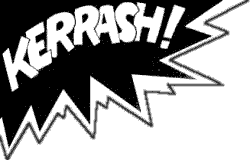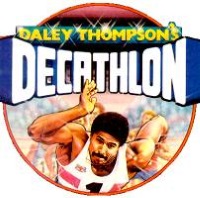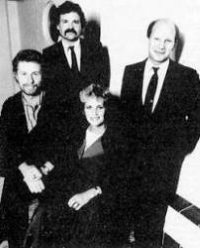
The Virgin Games gang (from left to right) Ian Mathais, Jeremy Cook, Pat Mitchell, Dave Chapman, Andy Wilson, Steve Webb, Angela Fitzgerald and Nick Alexander.


The Virgin Games gang (from left to right) Ian Mathais, Jeremy Cook, Pat Mitchell, Dave Chapman, Andy Wilson, Steve Webb, Angela Fitzgerald and Nick Alexander.
Scorning the apparent paradox inherent in giving a virgin a second chance, Virgin Games is going into Christmas with a fresh start. ‘We have changed with the market’, says Managing Director Nick Alexander. ‘The shot-gun approach won’t work anymore.’ Gone, it seems, are the days of releasing huge numbers of titles in the hope that some of them will be hits. Instead a more selective approach has been adopted. First out for the Spectrum is Strangeloop (reviewed in this issue) which has a £2000 robot for a prize riding on its competition. A later release will be The Biz, described as the ultimate computer game for the frustrated rock star. Written by Chris Sievey of the Freshies, who had a number of real life hits including ‘I’m In Love With The Girl On The Virgin Manchester Megastore Checkout Desk’, the game is said to contain ‘almost too much realism’.
The new games come with a new look in cassette cases with transparent backs so that the cover wraps around more like a book. The inlays are more straightforward and less hyped than previous ones in keeping with Virgin’s new tongue-in-cheek publicity (which is costing £¼m nevertheless).
Following the release of French is Fun and German is Fun, C.D.S. Microsystems have produced an audio cassette which is synchronised to run with both of the programs. The audio cassette is designed to aid correct pronunciation of the words and phrases contained in the two programs. It costs £3.50 on its own, or you can buy a three-pack containing French-German is Fun plus the audio cassette for £12.99, a saving of £2.41 over the individual prices of the three items.
Marketing giants K-Tel have announced major new plans to handle the production and distribution for a number of software houses both UK based and abroad. This move follows their launch into games software last year, and a period of considerable investment in researching and analysing market trends, they say. Let’s hope their extensive research has taken into account the somewhat less than marvellous games released by them for the Spectrum. Part of the reshuffle includes renaming their own software division — Front Runner. K-Tel have not announced yet whether they will be launching any Spectrum games, although Star Warrior, thought to be for the Commodore, is due about now.

It may have been exquisite timing that CRASH received its preview copy of Daley Thompson’s Decathlon the day after he secured the Gold at Los Angeles, but perhaps it just fell out that way. What would Ocean have done had the decathlete failed in his Olympics attempts (unlikely, but possible)? Unfortunately the preview copy was for the Commodore, and at the time of writing the Spectrum version has only just appeared for review.
The 10 decathlon events are all played under Olympic qualifying standards and are designed to destroy any joystick in a short time. On the Spectrum version (written by Dan Hartley, Paul Owens and Christian Urquhart) you compete against the computer. The game is £6.90 with royalties going to the British Amateur Athletic Board. Ocean has also announced Hunchback II for future release.

Clockwise from the top: Jon Woods and David Ward directors of Ocean with Anne and Geoff Brown directors of Centre Soft.
Still on the subject of Gold and Ocean, Centre Soft, the West Midlands software distributors, have joined forces with Manchester-based Ocean to import, manufacture under licence and market American software under the name of US Gold. Ten leading American software houses have already signed contracts with US Gold. A lot of the games already out have been for the Commodore, but US Gold intends releasing Spectrum games as well which should shortly include Commodore hits like Beachhead. More as soon as we know.
Hodder and Stoughton the well known book publishers have moved into computer games, kicking off with an adventure called Peter Pan — The Adventure. Described as a sophisticated interactive adventure game, Peter Pan tests the wits of the player against pirates, Indians and wild beasts in the fantasy world of the Neverland. It comes packaged with a paperback edition of the book. Hodder and Stoughton have been associated with Peter Pan from the beginning, as they were the original publishers of the book. Its author, J.M. Barrie, left the copyright of Peter Pan to the Royal Hospital for Sick Children, Great Ormond Street, London and a royalty on the adventure game, as on all Peter Pan books, goes to this cause.
Softek’s Managing Director, Tim Langdell, has issued a mysterious press release on behalf of The Edge described as the ‘creative group’ which has broken away from Softek International. Langdell says, ‘Over the past few months I had been bringing together some of the best talent worldwide to form a unique group of programmers, graphic artists and musicians. Clearly Softek’s game creation and marketing division had grown immensely in the first half of 1984. The creative group requested to be able to form an independent division of Softek.’
Quite how this creative group squeezed into Softek International’s tiny two-room offices in London is a matter open to question — the latest in space compaction techniques no doubt. Anyway, they seem to have been busy getting Personal Computer Games game of the month award for their Commodore game Quo Vadis, and more amazingly entering the Computer & Video Games Hall of Fame pages before releasing the Spectrum game Starbike. These two games are described by The Edge as megagames — the first ever, and with a follow up title of Psytraxx, Softek and The Edge are beginning to sound a little like a Liverpool giant. Let’s hope Softek doesn’t go right over The Edge.

Exhibiting a most uncharacteristic lack of punctuality, the great British detective has at last arrived from Australia in the new megadventure from Melbourne House — Sherlock (reviewed in this month’s Adventure Trail). The programming team led by Philip Mitchell has been at work for over 15 months in an attempt to hop over The Hobbit and create another landmark in computer adventuring. The backgrounds and location descriptions are true to their period, right down to the steam trains on London’s Underground. Anyone who doubts the authenticity of this point should take a trip to Baker Street station (District and Circle Line platforms) which has been recently cleaned up and clearly shows the huge sloping vents used to release the smoke and fumes from the platform. Sherlock costs £14.95.
A number of software houses recently seem to have been changing their names from one thing to another — whether to confuse them or us is not known. Latest to jump on the bandwagon and cover its tracks is Computer Rentals Limited (C.R.L.) who, with fiendish cunning, has disguised itself under the new name of CRL Group PLC.
Statacom Distribution have secured the rights to market the Datafax Spectrum Disk Interface. The system is designed for the Datafax/Hitachi 3" disk drive although it can also be used on single sided 40 track 5.25" disk drives.
The disk interface comes complete with leads and a comprehensive manual. It only uses 8K of user memory for the operating system and allows other peripherals to be added via its own edge connector. The interface also has a system reset button which gets round the irritation of constantly plugging and unplugging the Spectrum mains lead.
The system will save BASIC and machine code programs as well as arrays. A utilities diskette is provided to allow immediate use of the system while learning the commands. Formatting is carried out by the interface rather than by a BASIC program. The maximum number of files per side on the diskettes is 78 (of less than 3K per file) and there is a storage capacity of 100K per side. The user may call on the diskette inventory, erase unwanted files and make back-up copies. The ZX Spectrum Disk Interface was launched at the Personal Computer World Show.

Readers wanting to know why CRASH hasn’t had a review of Dangermouse yet may be interested to hear that we haven’t yet had a preview copy of the game (‘yet’ is the 5th September). The reason behind this would appear to be that Creative Sparks, producers of Dangermouse (the game) have been employing what might be called ‘cross-magazine diplomacy’ in that CRASH was given Blackhawk and Stagecoach as ‘exclusives’ while Computer & Video Games got Dangermouse.
Dangermouse in Double Trouble, released in early October, costs £6.95 and for that money will pit you, the greatest secret agent in the world, against the villainous, megalomaniac toad Baron Silas Greenback and offers a competition to the most skilled players who could win a trip to the Cosgrave/Hall studios to meet the creators of Dangermouse. The transport will be by Rolls Royce and helicopter. A review of Dangermouse will appear in the next issue.
Elite Systems Ltd., formed from Richard Wilcox Software has expanded its in-house programming force to cope with the fiercely competitive home computer market. With a company motto of ‘Right Product, Right Price, Right Time!’ Elite have launched their first new game, Kokotoni Wilf for the Spectrum.
The new team consists of Rory Green, responsible for graphics design, Neil Bate, a series 65 programmer, Andy Williams and Stephen Lockley, both Z80 based machine programmers, Paul Smith and Pat Maisey on the administration side and Richard Wilcox’s brother Steve, as sales and marketing manager. Kokotoni Wilf is reviewed in this issue.
While you wait for Psybanderclapsesnatch you may want to fill in time by typing in some magazine listings. In which case you need a MEGARULE. The Megarule (from Mega marketing, who else?) is made of solid perspex, and when placed over those tiny lines of listing magnifies them by 100%. You can have it in clear plastic or, for real mega-listers, it can be slightly tinted — ours is in blue. The Megarule costs £2.99 and is distributed through Dealer Deals Ltd.
Interceptor Micros, whose Message From Andromeda received an enthusiastic review in a previous issue of CRASH, have just released a new graphical adventure for the Spectrum called Forest At Worlds End. It is a mystical story about the continual battle between the forces of Light and Darkness, and is another princess rescue game. Princess Mara is captured by the evil wizard Zarn, and your task is to go get her and bring her safely back to the Great Valley. Interceptor are fairly new to the Spectrum, having previously concentrated more on the Commodore 64 with arcade games like their Wallie series, but their incursion into Spec territory appears to be going strong. Forest at Worlds End will be reviewed in full shortly by Derek Brewster in Adventure Trail.
Liverpool firm Bug-Byte has finally launched a Spectrum version of their popular graphic adventure Twin Kingdom Valley. It first appeared ten months ago on the BBC/Electron and CBM64, whose graphical capabilities are considered less restricting than those of the Spectrum — conversion was thought to be impossible. But the author, Tony Hall, in collaboration with Bug-Byte’s programming team have managed it, giving the Spectrum version rather more hi-res location pictures than the Commodore has at over 150.
Almost every game released these days is accompanied by flurries of ‘technical wizardry’ rather like the how-it-was-done cinema brochures for a Spielberg movie, and Twin Kingdom Valley is no exception. Bug-Byte refer to their game as ‘the greatest achievement in the history of home computing. Techniques never before used...’ etc. We’ll see next month when Derek Brewster reviews it, hopefully with his Currah microspeech unit plugged in. Twin Kingdom Valley is available now at £7.95.
Many readers as well as people in the software business have complimented CRASH on its fine colour screen shots and black and white shots. These have been made possible by using the Microvitec Cub Monitor, and its video quality is responsible for the crispness of the image most especially noticeable in the colour shots. The black and white photographs go through a different reprographic process which tends to lessen their definition over the colour. The Cub has two disadvantages — many of our reviewing team have access to a Cub for seeing games, and it makes them look so good that we often see things in the graphics that the reader may not see at home on the ordinary television! The other is that it has no sound so you’ll need an amplifier or television set near by if you use a Currah microspeech unit. For the technically minded (as they say in photographer magazines) the screen shots use an exposure time of ¼ second at between f16 and f22. ¼ second allows 6 TV frames to expose thus evening out the roll bar effect you get on a TV when it is photographed.